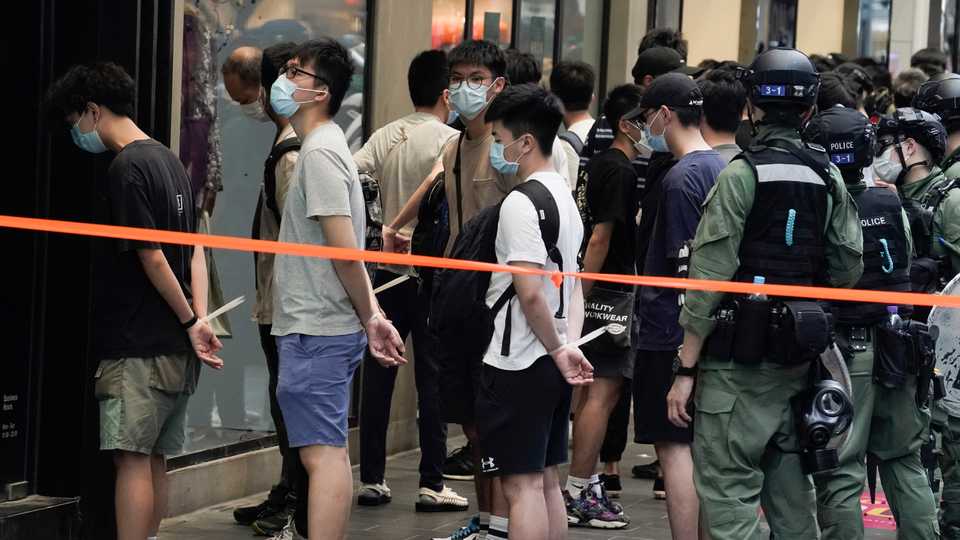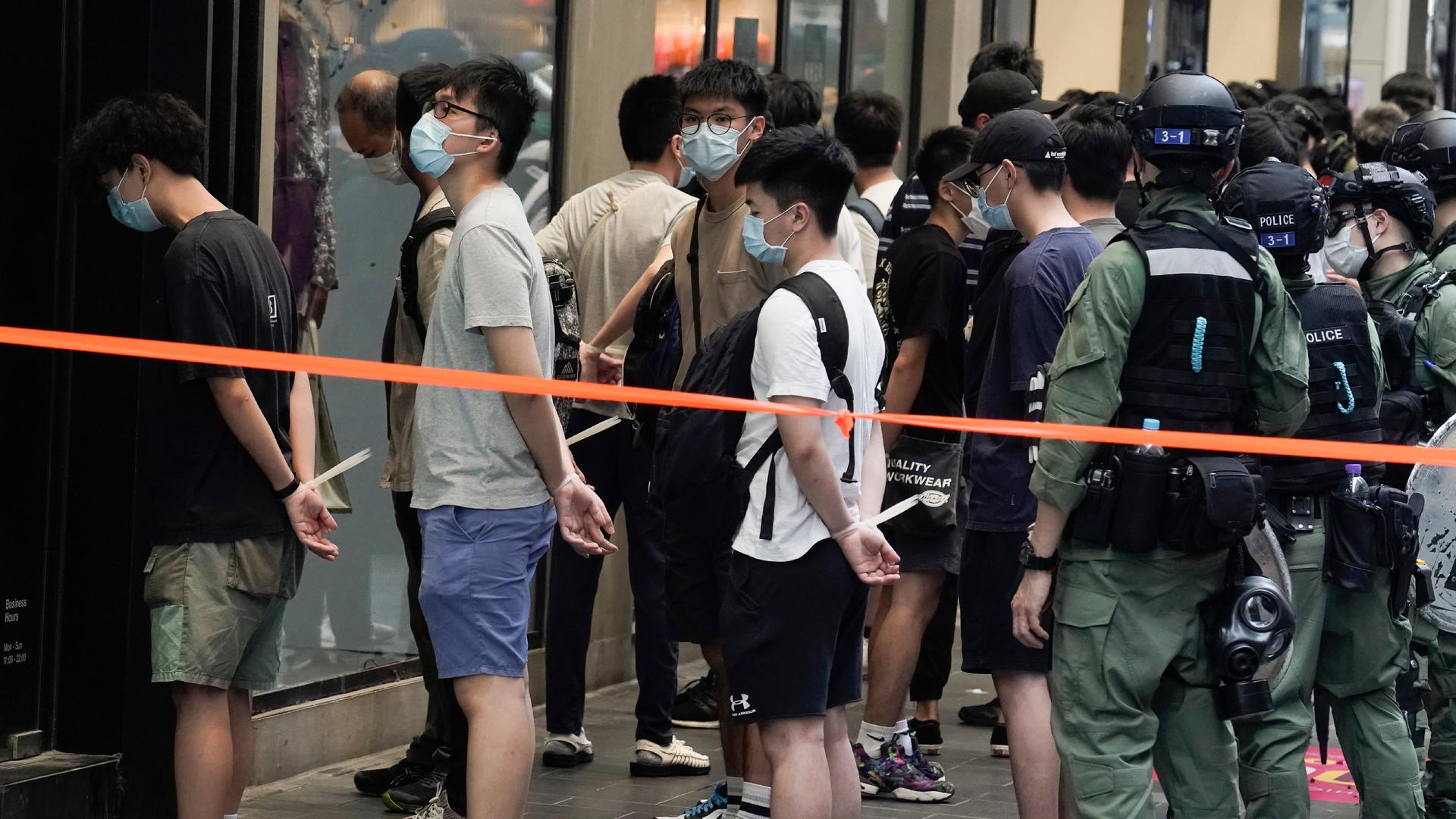
Hong Kong’s leader has hailed her city’s “return to peace” after China imposed a security law that helped quash last year’s anti-Beijing movement, with dozens arrested and thousands of police on standby to stamp out any mass rallies during National Day celebrations.
The People’s Republic of China celebrates its founding on October 1 with a holiday and carefully choreographed festivities.
But in Hong Kong, it has become a day of grievance for those worried about Beijing’s intensifying crackdown against its opponents.
Protest has been effectively outlawed for most of this year and Beijing also imposed a strict national security law on the semi-autonomous business hub in June.
Dozens of people were arrested or searched in a Hong Kong shopping district on Thursday for defying a ban on protests as the restless financial hub marked China’s National Day, police said.
“After repeated warnings were ignored, police on scene arrested at least 60 people, including two district councillors, on suspicion of ‘participating in an unauthorised assembly’ and other related public security crimes,” police said in a statement on Facebook.
On Thursday morning, helicopters flying the Chinese and Hong Kong flags buzzed the harbour as Chief Executive Carrie Lam and senior mainland officials attended a ceremony ringed by police and security barriers.
“Over the past few months, an indisputable fact in front of everyone is that our society has returned to peace,” Lam said in her speech.
“Our country’s national security has been protected in Hong Kong and our citizens can again exercise their rights and liberties in accordance with laws,” she added.
Last year, the 70th anniversary brought fierce clashes between protesters and police during seven months of anti-Beijing demonstrations that upended Hong Kong.
Authorities denied permission for a protest march this year, citing security concerns and an anti-coronavirus ban on more than four people gathering in public.
Lam’s administration also suspended September local elections for a year, one of the few occasions when Hong Kongers get to cast a vote, citing the risk posed by the pandemic.
A police source told AFP that 6,000 police officers had been drafted in to stop any protests, double the contingency usually placed on reserve.
READ MORE: Hong Kong activist Joshua Wong arrested for unauthorised assembly
‘End one-party rule’
Throughout the morning, groups of prominent activists held small rallies, deliberately keeping to no more than four people.
One group chanted “end one-party rule” and burned a protest petition, surrounded by some 40 police officers.
Others gathered in groups of four outside the heavily guarded Liaison Office that represents Beijing’s government in the city.
“In today’s China, those who pursue freedom are suppressed while those doing the suppressing are in power,” activist Lee Cheuk-yan told reporters.
A day earlier, office director Luo Huining gave a speech calling for more patriotism to be instilled in Hong Kong, saying pride for the motherland was a duty, not a choice.
Police maintained a high presence throughout the city on Thursday, conducting multiple stop and searches.
Five people were also arrested earlier in the week on suspicion of inciting others to protest and commit violent acts.
The rejected rally application was made by the Civil Human Rights Front, a coalition that organised record-breaking marches last year.
The group is calling for the release of 12 Hong Kongers in mainland Chinese custody who were caught last month trying to flee protest-linked prosecutions.
Those 12 were trying to escape to Taiwan by boat but were intercepted by the Chinese coastguard and have since disappeared into the mainland’s opaque judicial system.
For most of this year, protest has been all but impossible in Hong Kong.
On the rare occasions when demonstrations do bubble up, riot police and plain-clothes officers move quickly, on one day last month nearly 300 people were arrested.
Over the last 16 months, more than 10,000 have been detained during protests and the courts are crammed with trials. Many prominent protest leaders are being prosecuted.
READ MORE: Protesters in Hong Kong rally against postponed elections and security law
‘National Mourning’
Four members of the League of Social Democrats, led by veteran activist Leung Kwok-hung, known as Long Hair, marched holding a banner reading “there is no national day celebration, only national mourning”. Four is the maximum number of people allowed to gather under coronavirus restrictions.
The October 1 China national day is resented by many democracy supporters who say Beijing is eroding the wide-ranging liberties the former British colony was promised when it returned to Chinese rule in 1997.
For pro-Beijing supporters, it is an opportunity to drum up patriotism in China’s most restive city.
At the flag raising ceremony, Lam praised China’s success in curbing the coronavirus and its economic recovery, calling it “a rare bright spot” which “has shown once again the shift of the global economic focus from the West to the East”.
READ MORE: Hong Kong arrests opposition lawmakers over 2019 protests
New security law
The crackdown has been aided by the national security law that China imposed on the city in June.
The broadly worded legislation criminalised expressing certain opinions, deepened the political chill seeping into the city and allowed mainland China’s security apparatus to operate openly in Hong Kong for the first time.
The security law has led to sanctions by the United States and condemnation by many other Western nations.
But Beijing and Hong Kong authorities say it is needed to restore stability.
“The national security law will absolutely stop rabble-rousers in Hong Kong from having their capricious way,” the Liaison Office, which represents China’s government in Hong Kong, said this week.










Discussion about this post